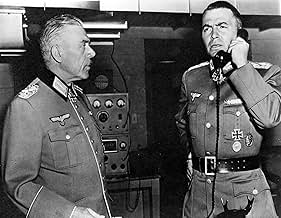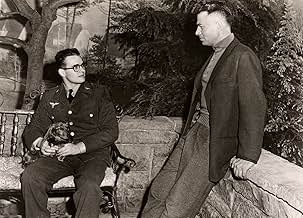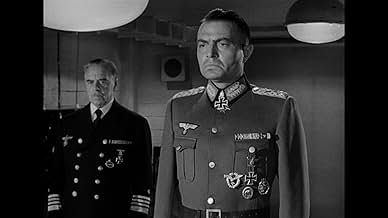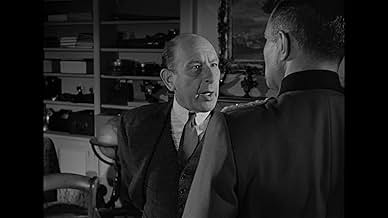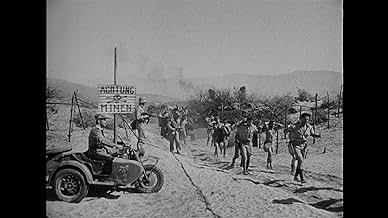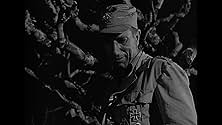The story of the final years of the respected World War II German general, Erwin Rommel.The story of the final years of the respected World War II German general, Erwin Rommel.The story of the final years of the respected World War II German general, Erwin Rommel.
- Director
- Writers
- Stars
- Awards
- 1 win total
Philip Ahlm
- German Soldier & Chauffeur
- (uncredited)
John Alderson
- German Sergeant
- (uncredited)
- …
Jack Baston
- Gen. Alfred Jodl
- (uncredited)
Robert Bohannon
- Minor Role
- (uncredited)
Boyd Cabeen
- Minor Role
- (uncredited)
Roland Carpenter
- German Officer
- (uncredited)
Mary Carroll
- Rommel's Maid
- (uncredited)
Steve Carruthers
- Signal Man
- (uncredited)
- Director
- Writers
- All cast & crew
- Production, box office & more at IMDbPro
Featured reviews
Wonderful performances, first-rate script and direction (moving musical score in key places, as well), plus a well-structured theme about moral dilemmas of patriotic soldiers who realize they're obeying evil orders, make this a little-known gem.
Did Rommel really participate in the plot to kill Hitler? Hitler sure thought so. He had his favorite general poisoned; about that there is no question.
Did Rommel know Hitler before the war? Not sure when they became acquainted but Rommel ran AH's bodyguard unit for a while, then became one of Hitler's favorite generals when he helped sweep the British to Dunkirk in 1940.
Was Rommel aware of and morally responsible for the Holocaust? A recent award winning Rommel biography cites one scene I wish they could have included in this film: Rommel around 1941 advised Hitler that he was concerned by Allied carping on German anti-semitism. "Why don't we put some Jews into prominent leadership positions and shut them up?" Rommel suggested. Hitler told Rommel to stick to military matters and, after the general exited the room, told associates: "That fellow has absolutely no understanding of what we are trying to accomplish."
The movie does generally succeed in portraying the theme of a soldier so single-mindedly focused on the professional technique of his job that he only slowly awakens to the moral horror and self-destructiveness of the leader he serves.
The Churchill quote used at the film's ending is meant to address (and answer) the questions about whether it is morally proper to make a film that glorifies a Nazi general. If Churchill could say such magnanimous things about him...and it's an accurate quote...then so could Hollywood.
(Interesting historical note: British film audiences in the early 1950s were not in such a generous mood. The studio quickly churned out the much-inferior "Desert Rats" film, featuring Mason as a more-villainous Rommel, to mollify outraged critics.)
Where did the quote come from that is spoken in this film by von Reunstadt: "Victory has a thousand fathers, but defeat is an orphan"? Yes, JFK used it, famously, after the Bay of Pigs fiasco. Many newsmen of the time mistakenly credited the president with originating it, but JFK didn't claim credit for it. The line has since been traced back to some Italian count in the 1500s. His name was Ciano or something like that. But JFK was a big movie fan and, my guess is, probably learned this aphorism from "The Desert Fox" a decade before using it in his famous post-Bay of Pigs press conference!
Did Rommel really participate in the plot to kill Hitler? Hitler sure thought so. He had his favorite general poisoned; about that there is no question.
Did Rommel know Hitler before the war? Not sure when they became acquainted but Rommel ran AH's bodyguard unit for a while, then became one of Hitler's favorite generals when he helped sweep the British to Dunkirk in 1940.
Was Rommel aware of and morally responsible for the Holocaust? A recent award winning Rommel biography cites one scene I wish they could have included in this film: Rommel around 1941 advised Hitler that he was concerned by Allied carping on German anti-semitism. "Why don't we put some Jews into prominent leadership positions and shut them up?" Rommel suggested. Hitler told Rommel to stick to military matters and, after the general exited the room, told associates: "That fellow has absolutely no understanding of what we are trying to accomplish."
The movie does generally succeed in portraying the theme of a soldier so single-mindedly focused on the professional technique of his job that he only slowly awakens to the moral horror and self-destructiveness of the leader he serves.
The Churchill quote used at the film's ending is meant to address (and answer) the questions about whether it is morally proper to make a film that glorifies a Nazi general. If Churchill could say such magnanimous things about him...and it's an accurate quote...then so could Hollywood.
(Interesting historical note: British film audiences in the early 1950s were not in such a generous mood. The studio quickly churned out the much-inferior "Desert Rats" film, featuring Mason as a more-villainous Rommel, to mollify outraged critics.)
Where did the quote come from that is spoken in this film by von Reunstadt: "Victory has a thousand fathers, but defeat is an orphan"? Yes, JFK used it, famously, after the Bay of Pigs fiasco. Many newsmen of the time mistakenly credited the president with originating it, but JFK didn't claim credit for it. The line has since been traced back to some Italian count in the 1500s. His name was Ciano or something like that. But JFK was a big movie fan and, my guess is, probably learned this aphorism from "The Desert Fox" a decade before using it in his famous post-Bay of Pigs press conference!
This is a fine biopic of a worthy and honorable opponent serving a despicable cause. Unfortunately, there is not enough North Africa Campaign in the film to satisfy a war film buff. When I first saw it in the theater, it did whet my appetite to learn more about this horrendous and costly war. I have been interested in it since. The acting is first-rate, and, unlike Enemy at the Gate, the British and American accents don't detract from the film, the British accents at any rate. As others have noted in their reviews of this film, Rommel probably wasn't anti-semitic. He deliberately ignored Hitler's orders to round up Jews during the invasion of France. He also never forgave Hitler for abandoning the Afrika Korps to their fate in 1942, not to Hitler's less than energetic attempts to keep the DAK supplied.
Although a very well crafted and watchable film that stays close to the historical characters and events, without the usual Hollywood treatment of such period war movies - action heroes, love interest, bangs and explosions etc., however there is some strange castings. Notably Manfred, Rommel's son, who looks like a 1950's geeky American college kid. Jessica Tandy, a much underrated actress is superb. Mason could act the pants of any other actor and shines in this film, as indeed he did playing the same role in The Desert Rats. Richard Boone in a rare non-cowboy role makes me wonder why he never prospered in mainstream cinema. For once Hollywood manages to make a factual film without distorting history in order to get bums on seats and sell popcorn.
The film is a Rommel biography written by Lt.Colonel Desmond Young and screenwriter Nunnally Johnson . It's based on true events and real characters . In WWII Field Marshal Erwin Rommel won reputation as Germany's most popular General but he played an important part in the invasions of central Europe and France . At the same time he was regarded by many Allied officers as a master of desert warfare and as a fair-minded professional . Erwin Rommel (James Mason) really achieved fame as the commander of the German Afrika Korps , operating against the British in North Africa and he captured Tobruk ,the key to the British defenses . Quick to see advantage and profit from it , he ran rings round the British for almost two years before being stopped at Alamein and then driven out of Africa by General Marshal Montgomery . Later on , Rommel was given command of Army in northern Italy to prevent an Italian defection and to counter an Allied invasion of Southern Europe . In 1944 he was transferred to command of an army group in northern France.On two occasions,Rommel and Von Rundstedt (Leo G.Carroll) saw Hitler and attempted to convince him that he should end the war while considerable German forces still existed.The pale and shaken Fuehrer met their frankness with angry diatribes.After the Allied invasion of Normandy (June 6,1944) , Rommel was severely injured when his automobile was strafed by a British plane,and he was sent home to Ulm to recover along with his wife Frau Lucie Marie (Jessica Tandy) , his personal assistant Capt.Hermamn (Richard Boone) and military son. By this time , he had become increasingly disillusioned not only by Hitler's unrealistic military leadership but also by the worldwide reaction to Nazi atrocities . He opposed the project assassination attempt on Hitler's life on the ground that this action would only create martyr . Rommel never took an active role in the July Plot executed by Colonel Klaus Von Stauffenberg (Edward Franz) , although the conspirators wanted him as Chief of state after the elimination of Hitler.However the plot failure ,one of the conspirators , before he died in agony on a meat hook , blurted out Rommel's name to his tormentors and his doom was sealed , offered the choice of a court-martial or reprisals against his his family or suicide.
In the film appears famous Nazi characters who are well interpreted by awesome actors , as Hitler featured by Luther Adler gives an excellent performance (but doesn't reach to Bruno Ganz in ¨The downfall¨) , Edward Franz as a magnificent Von Stauffenberg , Leo G. Carroll as Von Rundstedt , Everett Sloane (Gen. Wilhelm Burgdorf) , George Mc Ready (Gen.Fritz Bayerlein) , John Hoyt (Gen.Keitel) and of course Rommel's James Mason who displays a first-rate interpretation and he'll repeat role in ¨The Desert Rats¨ (1953) by Robert Wise . The motion picture was professionally directed by Henry Hathaway . Rating : Good , above average and well worth watching .
In the film appears famous Nazi characters who are well interpreted by awesome actors , as Hitler featured by Luther Adler gives an excellent performance (but doesn't reach to Bruno Ganz in ¨The downfall¨) , Edward Franz as a magnificent Von Stauffenberg , Leo G. Carroll as Von Rundstedt , Everett Sloane (Gen. Wilhelm Burgdorf) , George Mc Ready (Gen.Fritz Bayerlein) , John Hoyt (Gen.Keitel) and of course Rommel's James Mason who displays a first-rate interpretation and he'll repeat role in ¨The Desert Rats¨ (1953) by Robert Wise . The motion picture was professionally directed by Henry Hathaway . Rating : Good , above average and well worth watching .
While a highly rewatchable war movie, with a corker of a performance from James Mason, this motion picture does have its inaccuracies--beginning with its memorable opening. In truth, British commandos did not sneak or charge in, outfitted in nightfighting fatigues; they simply walked in, disguised in Axis uniforms with fake ids. Though the covert mission proved a fiasco, Rommel, in true chivalrous tradition, had these would-be assassins buried with full military honors. However, cinematically-speaking, it's a gripping moment, and it's considered the first true pre-credit movie sequence, a trick one would see quite often in later movies, such as the Bond films and others.
The movie focuses largely on the Field Marshall's involvement with the attempted assassination of Hitler, but just how much (or how little) Rommel was involved is still arguable. Curiously, James Mason once mentioned how he was up for the part of Rommel and was competing with another Fox contract-player, Gary Merrill (best known as Bette Davis's love interest in ALL ABOUT EVE). Mason was impressed by how well Merrill marched and strutted, doing bits of military-like physical action that didn't come easily to the urbane Mason. Even though Mason ultimately won the part over Merrill, he self-critically felt he didn't fully do the role justice (though many, including myself, wouldn't agree with him). Perhaps the studio opted for Mason to bring out a sympathetic quality, because viewers do tend to forget the numbers of Allies who died directly because of the main character! Rommel was a great general for his energetic and ingenious tactics, not for (possibly) wanting Hitler killed.
Don't get me wrong; this movie is still a joy.
The movie focuses largely on the Field Marshall's involvement with the attempted assassination of Hitler, but just how much (or how little) Rommel was involved is still arguable. Curiously, James Mason once mentioned how he was up for the part of Rommel and was competing with another Fox contract-player, Gary Merrill (best known as Bette Davis's love interest in ALL ABOUT EVE). Mason was impressed by how well Merrill marched and strutted, doing bits of military-like physical action that didn't come easily to the urbane Mason. Even though Mason ultimately won the part over Merrill, he self-critically felt he didn't fully do the role justice (though many, including myself, wouldn't agree with him). Perhaps the studio opted for Mason to bring out a sympathetic quality, because viewers do tend to forget the numbers of Allies who died directly because of the main character! Rommel was a great general for his energetic and ingenious tactics, not for (possibly) wanting Hitler killed.
Don't get me wrong; this movie is still a joy.
Did you know
- TriviaErwin Rommel's widow, Lucie Marie Rommel acted as a technical consultant and adviser to this movie. She was played by Jessica Tandy in the film itself. Mrs. Rommel lent the production some of her husband's personal artifacts and liaised with Nunnally Johnson, the film's producer and screenwriter. As Frau Lucie Maria Rommel, Mrs Rommel later also acted as a military consultant to the film The Longest Day (1962) made by 20th Century-Fox, the same studio that produced this movie.
- GoofsThe opening commando raid shows at least a dozen German soldiers killed. In reality, only four were killed.
- Quotes
Field Marshal Gerd von Runstedt: [It's] too late for me. I'm seventy now - too old to fight, too old to challenge authority, however evil... but not too old, however, to wish you and your friends the best of luck in their extremely interesting enterprise.
- Crazy creditsThe 20th Century Fox logo appears without the usual fanfare.
- ConnectionsEdited from Desert Victory (1943)
- SoundtracksThe Army Air Corps Song
(uncredited)
Music by Robert Crawford
Heard during the scenes of D-Day and the ensuing battles
Details
- Runtime
- 1h 28m(88 min)
- Color
- Aspect ratio
- 1.37 : 1
Contribute to this page
Suggest an edit or add missing content


